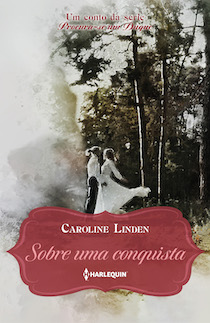 Agnes St. James was her father’s favorite child.
Agnes St. James was her father’s favorite child.
Some of her earliest memories were of bouncing along atop his shoulders as he did errands around Edinburgh. Her mother protested, but George St. James just laughed and took Agnes to the Exchange, to his banker, to visit merchants. He taught her to ride their pony astride, without her mother’s knowledge. He taught her to swim in the firth, this time with her mother’s approval. He took her on long walks in the nearby countryside, and even taught her to play golf and cricket with her older brother Andrew and his friends.
But her favorite place to go with Papa was the family’s silk shop. He had bought it when she was a small child. By then Drew was in school and her mother was home with her two little sisters, Winifred and Isabella, so Agnes got Papa all to herself at the shop. He would sit her on the counter and let her touch the shining bolts while he told her where the silk came from and how it was made.
Agnes loved the shop. She loved running her fingers over the beautiful, delicate silks, imagining them made into lovely gowns and frock coats. She couldn’t wait to stand behind the counter and unfurl a roll of silk before someone’s rapturous gaze, the way Papa did.
Papa was delighted by her interest. “That’s my clever girl,” he would exclaim as she figured yardages and costs on her slate for him. By the time she was ten, Agnes had come to think of the shop as her future, and she spent hours daydreaming of how she would arrange the window displays and the salon, when it was hers.
A month after she turned twelve, Papa developed a cough. Mama scolded him and begged him to stay in bed, but he insisted he needed to work. Agnes, by then allowed to come to the shop every afternoon, listened as his cough grew harsh and hacking.
The doctor came, but no tonic or poultice helped. In a matter of weeks, her hearty, active father sickened and wasted away until he simply didn’t wake up one morning.
Agnes was devastated. Mama wept until she fainted. Bella, almost eight, started sucking her thumb again, and Winnie wouldn’t come out of her room. Heartbroken, they buried him in the neat churchyard of St. Mary’s, only to discover that it was just the beginning of their nightmare.
Papa had not been good with money. In fact, he’d been quite bad with it, and now they had none—less than none, as there was a mortgage against the shop. Drew returned from the lawyer’s, white-faced and solemn, and told Mama they were actually rather poor.
Agnes grew up five years in one day when Mama, pale and quiet, put on her second-best dress—now dyed black—and went to take over the shop, leaving Agnes in charge of the house and her sisters with only the help of Annag, their sole remaining servant. She spilled soup on the floor, her sisters had a screaming fight that brought the neighbor to inquire what was wrong, and when Mama finally came home Agnes fled to her bed in tears.
The lowest moment, though, was the day Agnes arrived home and found Winnie eavesdropping at the parlor door, her ear pressed to the wood. “There’s someone here to see Drew,” she mouthed to Agnes, who scurried over to join her. The voices were coming closer to the door, and the two girls ran up the stairs to avoid being caught.
The door opened. Out came a man about Papa’s age, then a younger man. That was Felix Duncan, Drew’s friend, who played cricket and golf with them. Drew followed them, his head bowed. The man paused, speaking to Drew in a low voice.
Felix glanced up the stairs and saw them. Winnie gasped and fled. Agnes stayed where she was, her heart racing.
She knew Felix. He was the sort of boy who never backed down from an argument, who played hard until the last batsman was called out, who regularly was scolded for his smart mouth. Papa liked him immensely; “a good lad,” he’d said of Felix, even when Felix and Drew got into trouble together.
Today Felix gave her a long look, then a quick nod, as if to say, don’t worry, all will be well.
 When the visitors had gone, she crept down the stairs. “What did they want, Drew?”
When the visitors had gone, she crept down the stairs. “What did they want, Drew?”
Her brother looked far older than eighteen. “Mr. Duncan offered to help with Papa’s affairs, and then he offered a loan.”
“How much?” she whispered. That must have been what Felix’s nod meant, what a good friend indeed he was—
He sighed. “I can’t take it.”
“Why not?”
“What we need is money,” Drew said bleakly. “We already have enough debt.”
Three days later Drew accepted a lieutenancy in an army regiment being formed. A fortnight after that he was gone, leaving them with his first month’s pay and a promise to send more when he could. Mama told them they must bravely wave good-bye to him and not cry, but Agnes spied the tears on her mother’s cheeks as her brother disappeared up the street. Agnes and her sisters began going with Mama to the shop, sweeping the floors and tidying the workroom.
There were no more hikes on Arthur’s Seat, no more cricket. No one else came to call. They moved house twice to smaller and cheaper lodgings. Her brother was gone, her mother worried nonstop, and if not for the kind but anonymous neighbor who left a ham or joint of meat on their step every month, they would have gone hungry at times.
But they still had the shop. It was the only thing that carried her onward. It was her link to Papa, her hope for the future, and Agnes vowed she would make it the best in all Edinburgh.
Felix Duncan was his father’s pride and joy.
There were five other names in the family Bible, three before his and two after. Only one of those sons had lived longer than a year, and Felix didn’t remembered any of them. He only dimly remembered his mother, who died when he was five. Felix was all his father had left.
At times it was wonderful. He never had to work for his father’s attention; every day at breakfast and dinner he had it. No matter how petty or small his complaint or victory, his father listened. If a tutor made Latin or mathematics confusing or dull, Lachlan Duncan would explain it patiently until Felix understood.
The Duncan men went into law. They all had for four generations, with the exception of one cousin who inexplicably became a merchant captain. Felix always knew he would be an attorney, from the time he had to stand on his father’s law books to see over the desk and watch Lachlan write a brief.
He always told Felix what he was writing. “Mr. MacDonald was arrested for murdering a man behind a tavern,” he would explain, “but he has been falsely accused.”
“How do you know?” It was his father’s favorite query to him, and Felix loved to turn it around on him.
Lachlan was pleased when he did. “Firstly, because he swore an oath that he did not. Secondly, because his wife and his landlord saw him at his home on the night his friend was murdered. And thirdly, because the poor soul who was killed was seen gambling that night with another man, and had accused him of cheating for all to hear.” Lachlan tapped his nose. “That casts serious doubt on the charge that Mr. MacDonald would hurt a man known to be his friend.”
“And that other man killed him?”
Lachlan would raise a finger. “I don’t have to answer that, son. I only have to show that Mr. MacDonald did not.”
 But at times, it was not wonderful to be the pride and joy. Sometimes it was a millstone around his neck. When he grew bored under a strict tutor’s hand and ran away into the alleys and closes of Edinburgh, or was caught sneaking the brandy, there was no one else to absorb his father’s temper.
But at times, it was not wonderful to be the pride and joy. Sometimes it was a millstone around his neck. When he grew bored under a strict tutor’s hand and ran away into the alleys and closes of Edinburgh, or was caught sneaking the brandy, there was no one else to absorb his father’s temper.
Once he complained to friends about it. “Damned unfair of my brothers, to leave me to carry on the Duncan honor myself,” he grumbled.
“Aye,” agreed Andrew St. James. “The redheaded runt of the litter. Your poor da.” Which started a wrestling match that Felix won only by dint of refusing—ever—to cry pax.
St. James never disappointed his father, Felix was sure. Drew was the image of his father: tall and athletic, good-humored and amiable. Unlike Lachlan Duncan, who was often in court or the Advocate’s Library at Parliament Square, George St. James had time to umpire cricket matches and hike the nearby hills. If Felix didn’t quite want to be a St. James, he wouldn’t have minded if his father were more like Drew’s.
Until Mr. St. James died suddenly.
That was terrible. Felix dimly remembered when his own mother died, when he was five. But Felix didn’t realize how terrible it was until Drew said he could not go to university that fall after all.
They had expected and planned to go together. It was unthinkable that Drew wouldn’t; he was a lord’s grandson, and belonged at university. Something had to be done.
His father was surprised by his request. “Help the St. Jameses?”
He nodded. “Mr. St. James died last month. They’re in a bad way.”
“Ah,” murmured Lachlan. “What do you propose?”
Felix opened his mouth, then hesitated. “There must be something we can do…”
His father waited.
“There are three little girls, see,” he explained. “And the widow. Drew doesn’t see how they can survive if he goes to university.”
His father’s eyes narrowed, but he nodded. “Very well.”
It didn’t go as planned. Drew flushed when Lachlan offered funds, and failing that, legal advice. “Thank you, sir, but I think I’ve got it.”
Felix’s father didn’t let go easily. He quizzed Drew for half an hour, before sitting back with a nod. “If ever you need it, my offer remains.”
“Thank you, Mr. Duncan.” Drew jumped up to show them out.
Felix was deeply frustrated. In the corridor he caught sight of the two girls spying on them; one ran but the other stayed, her wide blue eyes anxious.
That was Agnes, the tenacious one who used to come along to the cricket pitch. Her father always let her play. She was too small to bat, but she was fast in the field. And she never ever gave up trying, which Felix admired.
He couldn’t disappoint her. Felix gave her a confident nod.
“What else can we do?” he demanded outside.
His father’s stride didn’t break. “Nothing.”
“What? Why?”
 Lachlan looked sharply at his indignant outburst. “He’s got pride. He won’t accept help.”
Lachlan looked sharply at his indignant outburst. “He’s got pride. He won’t accept help.”
“Yes, but… What will he do?”
His father stopped. “He’s your friend, aye?” On guard for a trap, Felix nodded slowly. “Then do him the courtesy of trusting him. He’s a grown man—too young to support a family, but it’s his decision to make. I can’t tell him what to do.” He gave Felix a speaking look. “He’s not my son, is he?”
No. Drew was not. But Felix was, and so Felix watched helplessly as his friend joined the army and left Edinburgh. That fall he went to university and studied law, as planned. He kept an ear out for the St. James family, but their shop remained open, and the girls looked healthy the few times he spied them. Drew must have figured everything out, as Lachlan had predicted.
But he never forgot the little girl with the big blue eyes.





